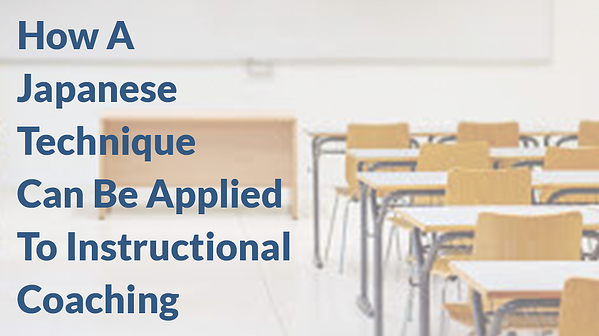I am a learner with ADHD and I tend to be a perfectionist when it comes to my own work. That can be a terrible combination. It often leads to procrastination and unfinished work because I am afraid it won’t look or be perfect. One way to overcome the fear of being perfect is to practice more. In Outliers: The Story of Success, author Malcolm Gladwell writes about the “10,000-Hour Rule”, claiming that the key to achieving world-class expertise in any skill, is, to a large extent, a matter of practicing the correct way for a total of around 10,000 hours.
That leads to a question: How do you know if you are practicing the correct way? One way is to get a coach. Specifically in education, an instructional coach can provide a new perspective, make you aware of mistakes and suggest ways for improvement. In my own development as an educational leader, I have had a principal coach observe my interactions with staff members for a year. Her valuable wealth of experience has helped me to become more effective in the areas of providing feedback and guiding teachers. I recognized the need to address negative remarks teachers made about students with questions that would make them aware that negativity towards students was unacceptable–and do it in ways that were non-confrontational.

Through repeated practice and taking steps to identify and correct mistakes, we become better.
The Japanese have a term for mistake-proofing known as poka-yoke. This approach was applied by Japanese manufacturers in the 1960s to industrial processes designed to prevent human errors. This process is what helped Toyota become one of the largest automobile manufacturers in the world. I had the pleasure of touring a Toyota assembly plant in south Texas recently and their manufacturing process is a wonder to behold. The workers are empowered to stop the assembly line at any point if they identify a mistake or discover a need that will help with efficiency or safety. So what does all this have to do with education?
I believe that when you take the time to observe yourself and reflect on your practice you are in essence practicing poka-yoke. An excellent and easy way to implement this is to begin using video as a tool for self-observation and reflection. Simply use your smartphone and press record while you teach a lesson. As you view the recorded video you will want to observe your practice and watch how your students engage. This will give you great insight into areas where you can improve, but also will reveal where your strengths lie, which is just as important. Making use of checklists can help you pinpoint specific things. From these observations, you can constructively begin to make goals for yourself–goals that ultimately will have a high impact on student achievement.

Reflecting on your own practice will help you improve as a teacher. And, combining self-reflection with frequent instructional coaching sessions will only help to further your growth as an educator. I am currently an instructional coach in a large public school district and I have been privileged to coach many teachers. As a result, they are able to transfer their learning to have a greater impact on their students’ success. Many of the teachers that I have worked with have become innovative leaders on their campuses and some have even moved up to the district level. This is in part due to frequent coaching sessions and self-reflection practices.
Every campus has a set of goals that they are working towards. The instructional coach is a supporting partner who can team up with teachers and help them to identify specific areas of need and establish classroom goals based on those needs. But before diving into the work, it’s important for teacher and coach to establish a trusting relationship. I have found teachers tend to trust most when they recognize you as a supportive, non-threatening, partner who is excited to lend expertise and willing to work collaboratively. When a transparent partnership is formed a synergy will develop and growth will occur.

If you have the desire to improve as an educator, I suggest you start using video to self-reflect. Once you are comfortable with observing your practice, consider working with an instructional coach who can offer a fresh perspective and partner with you towards meeting your goals. It may be a bit uncomfortable at first, but I am sure you will find the journey towards continuous improvement to be satisfying. In her best selling book, Daring Greatly author Brené Brown says; “Courage starts with showing up and letting ourselves be seen.” Letting yourself be a little vulnerable, and allowing your classroom be transparent is the critical first step in the coaching journey.
If you are a teacher in one of the schools I serve please reach out to me if you are interested in beginning your coaching journey! If you are an educator interested in discussing my coaching approach, I would love to hear from you in the comments section.
If you’re an instructional coach who is interested to learn how you can best support your educators with video, take a few seconds to schedule a quick test drive of our ADVANCEfeedback platform below.







